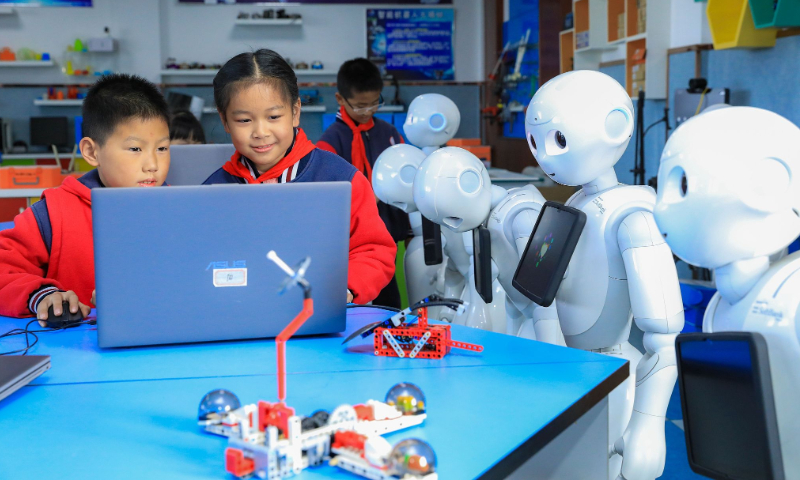
Students from the science and innovation club at a primary school in Huzhou, Zhejiang Province program and debug humanoid robots on November 29, 2023. Photo: VCG
China's Ministry of Education (MOE) on Thursday published a list of 184 primary and secondary school artificial intelligence (AI) education bases across the country including North China's Beijing, Tianjin, and East China's Shanghai, Shandong and Jiangsu provinces, and South China's Guangdong Province, aiming to promote AI education systematically nationwide.
The publicity period lasts from Thursday to January 17. Anyone who has objections can submit relevant information during this period, according to the ministry.
In May 2023, the MOE issued an action plan for deepening the reform of the basic education curriculum, in which it required teaching equipment and usage to be improved, and a group of characteristic high-level science and AI education primary and secondary school bases to be selected.
In Beijing, Tianjin, Shanghai and a few provinces, there are six schools on the list. Some schools started AI education in recent years in the face of the rapid development of AI technology, as a way to encourage more students to gain more knowledge in this sector, and inspire their creative capability to learn how to analyze data and identify patterns based on AI algorithms.
One example is Wenzhou No 22 Senior Middle School in East China's Zhejiang Province , which was founded in 2002. The school has always been at the forefront of information technology in the country, and has been awarded the title of one of the first "100 digital campus demonstration schools" in China.
"AI education has been explored in our school for nearly five years," Ding Die, vice principal of Wenzhou No 22 Senior Middle School, told the Global Times on Thursday.
The school has integrated the curriculum standards related to AI in the fields of information technology and general technology, and has incorporated the course content and practical applications into the school's AI education space. The space integrates the fields of design, teaching, and operation, and is equipped with 3D printers, laser engraving machines, high-end computers and other equipment, according to Ding.
Ding said that the schools will continue improving the relevant AI courses and popularize them among students. The school will also strengthen the connection between students and AI projects in universities, to make students' career planning clearer during their learning process.
Shanghai Luwan Senior High School has also been conducting AI education practice and exploration in recent years. This initiative to establish primary and secondary school AI education bases is highly beneficial to the public, and will be welcomed by parents and students, Zhang Xiaojun, a teacher who tutors students in science and tech classes from this school, told the Global Times on Thursday.
Due to the lack of equipment and teacher resources in some schools, students have limited space to learn more in this sector. With a nationwide drive to build AI bases, students will have the opportunity to delve into real technical content, participating in and gaining knowledge in this field, according to Zhang.
In the school, students are categorized into general courses, advanced courses, and high-level courses specifically designed for a few students. Every student can have access to some basic AI content, such as graphic programming, and using AI to solve practical problems. For advanced courses, they will study specific projects, such as autonomous driving, intelligent logistics, and drone programming, Zhang said.
Zhang said that systematic training and an incentive mechanism will be beneficial to cultivating more teachers in this sector. Ding, the vice principal, also echoed the opinion that it will encourage teachers to take every opportunity to train in AI teaching.
China will carry out further training sessions to boost the scientific competence of primary and secondary school teachers, said a circular jointly issued by the general offices of the MOE, the Chinese Academy of Sciences and the China Association for Science and Technology in July 2023. More than 3,500 teaching staff and science counsellors in primary and secondary schools have participated in the training sessions, which started from mid-July, according to the authorities.
Global Times




